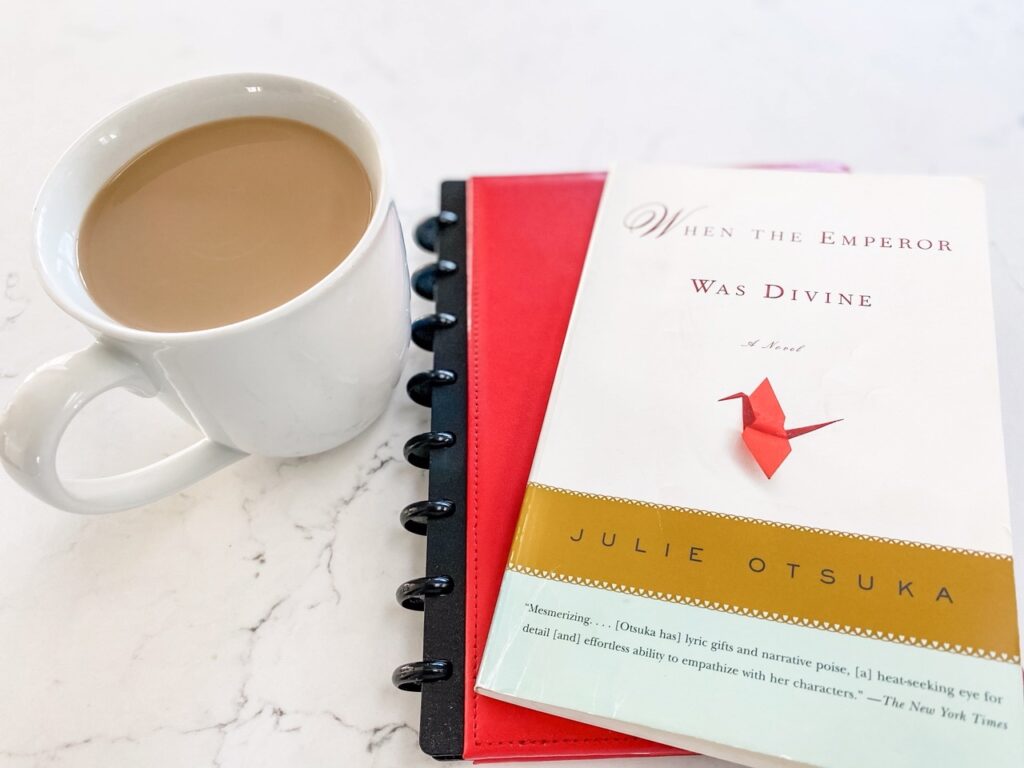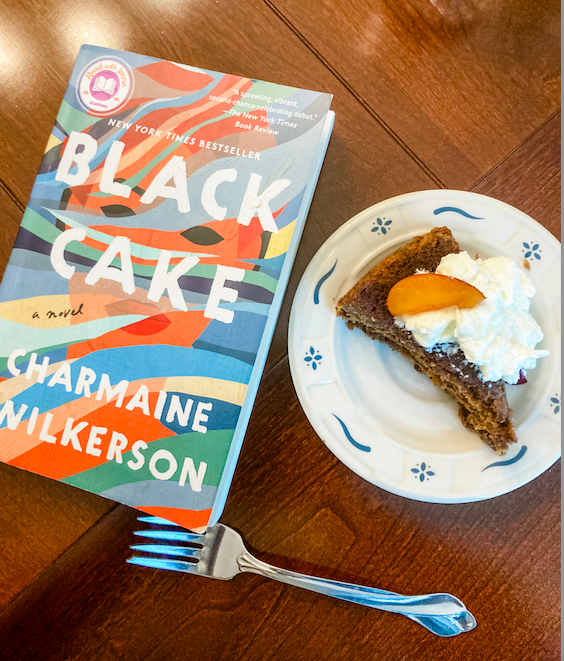Lessons from Julia Otsuka’s When the Emperor was Divine

I’m a slow reader. I sometimes pluck a book from the shelf based not on whether its subject matter appeals to me, but whether or not it’s skinny or fat. So when I recently read Julia Otsaka’s 144-page When the Emperor Was Divine, I got the pleasure of not only finishing a book in a weekend, but also got a mini-course in history and in skillful writing.
Otsaka’s grandparents, mother, and uncle were among the over 120,000 Japanese Americans who were forced into internment during WWII. Her novel is inspired by, though not an account of, her family’s time in the camps.
Here are five short lessons I took from this short book:
1-Passive voice can be the best choice
Otsuka says the idea for her novel began with an image of a woman standing in front of an evacuation order. She starts the first chapter with this sentence, “The sign had appeared overnight.” Normally when we say that something just “appeared,” we mean that we don’t know, or don’t want to say, where the thing came from or how it got there. We don’t specify an actor.
In this case, the writer, the point-of-view character, and the reader know exactly who is responsible for hanging this sign and the hundreds like it that “appeared” all over town that morning—the United States government. Rather than obscuring blame, the lack of a named actor in this opening sentence actually highlights who is responsible for the action.
Writers have been so conditioned to think of the passive voice as a construction to be avoided, we tend to underuse this valuable strategy. The passive voice, which is commonly employed in the service of tact and which can soften impact, can also heighten the impact when used smartly. The actor missing from the first sentence is on our minds.
2-Names can be optional
Some writers spend a tremendous amount of time choosing names for their characters. Needing to embody just the right symbolism, appeal, and fit, character names can change right up to the time of publication.
In When the Emperor Was Divine, the point-of-view characters are simply known by their positions in the family—the woman, the girl, the boy, and the father. Otsuka says she decided not to give the characters names in order to portray the universal experience of regular people sent into exile.
She’s not the only author to leave her characters nameless. The first-person protagonist in Daphne du Maurier’s epic novel Rebecca is never named, nor is the “whiskey priest” in Graham Greene’s The Power and the Glory. It’s a choice that can work, especially when the story leans into parable, allegory, or is meant to be representative.
3-Characters that speak less imply more
When Otsuka’s characters speak, it is often not more than a line or two. Except for the last chapter, which is a brilliant four-and-a-half-page first-person narration, you won’t find anything resembling a monologue here.
Over and over, Otsuka cleverly uses snippets of dialogue and indirect dialogue that represent full conversations. And the reader doesn’t need or want anything more. In one instance, the girl tells her brother, the boy, about all the sordid things happening at the camp:
She told him that Frank Masuda had a terrible case of athlete’s foot—“He showed me”—and that someone had stuffed a newborn baby into a trash can in Block 29.
“What did it look like?” the boy asked.
“You don’t want to know.”
“Yes I do.”
She said that Mrs. Kimura was really a man, and that a girl in Block 12 had been found lying naked with a guard in the back of a truck. She said that all the real stuff happened only at night.
The boy said, “I know.”
Why doesn’t the girl go into more detail about these events? Why don’t the characters say more? Because that’s not the point. And it doesn’t matter whether the newborn baby in the trash can really happened or was a rumor. The girl is coming of age in a camp that is a dystopia compared to their old life in Berkeley, and the otherworldliness mirrors the strange drama of her own private and public growing up.
The boy who says little is arguably the most observant character in the book. What he does not say—about their living conditions, his longing for his absent father, and about the shame and terror of their circumstances—is more important than what he does say. This is implication at its finest.
4-Child narrators do not have to be annoying
Okay, I know there are brilliant books, prize-winning books, that are written from a kid’s perspective. I love those books too. But I’ve also read so many novice manuscripts (my own included) that attempt to convey a child’s mind yet present a narrator that is unconvincingly sophisticated. Or worse, writers who end up resorting to juvenile diction or offering immature observations. The kind of writing that feels more goo goo gaga than True Grit-esque.
It’s Otsuka’s approach to point of view in When the Emperor was Divine that is unique here. Instead of using a deeply interior point of view, which would seem logical if you want to develop a convincing adolescent consciousness, she employs a more objective voice. We do get inside the characters’ heads, but she conveys their thoughts through matter-of-fact reportage, letting us perceive their adolescent states of mind through their observations, but never allowing them to editorialize about their situations. In the following passage, the boy doesn’t complain about the miserable windy desert, but he says this:
All night long he dreamed of water. Endless days of rain. Overflowing canals and rivers and streams rushing down to the sea. He saw the ancient salt lake floating above the floor of the desert. Its surface was calm and blue. Smooth as glass. He was drifting down through the reeds and fish were swimming through his fingers and when he looked up through the water the sun was nothing but a pale wobbly speck a hundred million miles above his head.
In the morning he woke up longing for a glass of Coke. Just one, with lots of ice, and a straw. He’d sip it slowly. He’d make it last a long long time.
A day. A week. A year, even.
The girl and the boy are distinct and unique characters, but again Otsuka masterfully puts one foot in the realm of the particular and another in the realm of the universal. These specific kids represent many kids, and she pulls this off through her adept execution of viewpoint.
5-Collective first person is a powerful POV
Over the last decade or so in my work as a writing teacher and literary magazine editor, I’ll occasionally come across stories written from the first-person plural point of view. But not often, and there’s a reason they’re rare. These stories challenge the writer and the reader with their lack of a familiar first- or third-person narrator. It’s not easy for a writer to capture the voice of a group. And without skillful execution, a reader can start to wonder, Did they really feel and act that way? All of them?
When the Emperor Was Divine is composed of five chapters, each one from a different point-of-view character. The fourth chapter is narrated by the collective “we” voice of the sister and brother. Otsuka gives us the experience of what is was like for them when they returned to their home after three years in the camp:
Many people had lived in our house while we were away but we did not know who they were, or where they had gone, or why we had never received a single check in the mail from the man who had promised to rent out our house. This man was a lawyer, his name was Milt Parker, he had shown up at our door the day after the evacuation orders had been posted and offered our mother his services. “I’ll take care of everything,” Mr. Parker had said. But where was he now? And where was our money? And why had our mother been so quick to open the door to a stranger? Because strangers had knocked on our door before. And what had happened? Nothing good. Nothing good. They had taken our father away.
Otsuka only uses this particular point of view for a chapter, and this is where I think the rest of us could take some inspiration from her. Although it’s possible to take on an ambitious book-length project written from the first person plural (Otsuka herself does so in her second novel, The Buddha in the Attic), it’s a great choice for shorter works, and I particularly love it when writers use bold choices like this in flash pieces.
When the Emperor Was Divine is a mini master class in fine writing. In fact, I plan to use the book in my classes—the writing prompts practically write themselves.
Originally published in CRAFT.






